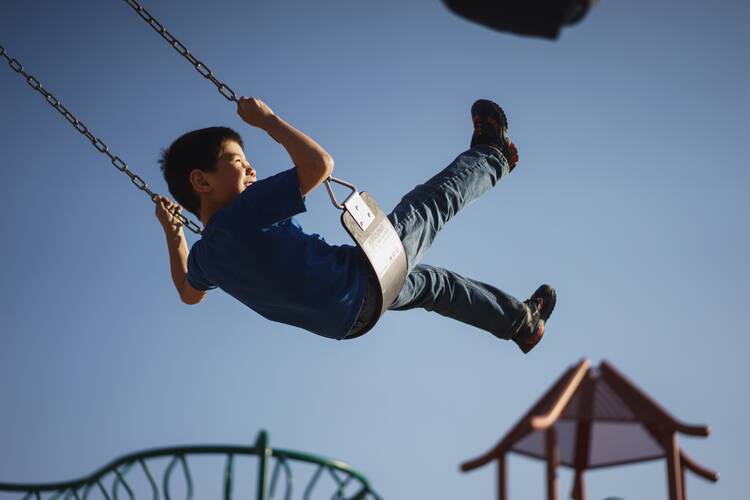Remember what it was like to swing as a child? A swing is the simplest of contraptions, but it could produce such joy. You were off the ground, moving quickly through the air. It was as much fun to move backward as it was forward because either way you were flying!
And do you remember learning to jump out of the swing when it reached its highest, forward mark? For a moment, you would go even higher and farther than the swing itself, seemingly defying gravity as you moved up into the air, your arms and legs splayed. Of course, you were going to hit the ground, but that seemed a small price for even a moment of pure flight.
There are adult pastimes that recreate something of the thrill of swinging. Snow and water skiing, parachuting and bungee jumping come to mind. But we pass most of our adult lives firmly planted on the ground. Not risking all that much, we largely forget the joy of flight.
We pass most of our adult lives firmly planted on the ground. Not risking all that much, we largely forget the joy of flight.
It can be this way in our relationship with God as well. We say that we believe in God. We mean it sincerely enough. It is just that, looking at our lives, we seem to be living more or less like those who have no God. People do not see us letting go of our tethers and flying, even for a moment, into open air.
Our Lord seems to describe most of us so aptly when he says,
If you have faith the size of a mustard seed,
you would say to this mulberry tree,
“Be uprooted and planted in the sea,” and it would obey you (Lk 17:6).
It is easy enough to remain firmly seated in the swing of life, not going all that high or fast, not even tempted to jump. We know that the two ends of life belong to God or, at the very least, that they do not belong to us. We have no idea how we entered life or what will happen to us when life ends. We just keep on swinging.
Yet we sense that we were made to fly. The desire runs into the depths of who we are.
For the vision still has its time,
presses on to fulfillment, and will not disappoint;
if it delays, wait for it,
it will surely come, it will not be late (Hab 2:3).
Christ came among us as someone who flew. Someone who wagered everything and took flight. He hit the hard rock of Calvary yet, with his resurrection, revealed the deepest truth about ourselves: We were made to fly.
You just cannot be a disciple of Christ without trying to fly, at least a little, in this life. You must risk letting go. Sometimes this means setting boundaries for our all-too-human temptation to make everything and everyone into instruments of our own needs and desires. It means letting go of our need to control.
You just cannot be a disciple of Christ without trying to fly, at least a little, in this life. You must risk letting go.
We say that human life in all of its stages, from conception through natural death, must never be made into an instrument. Human life does not become disposable because we are not ready for it or because it has become burdensome. Even heinous guilt does not erase the humanity of human life.
Many of our contemporaries make human life itself into an instrument, an object at their disposal. They abrogate God’s dominion over life in the name of justice or because a child is unwanted or because life seems too burdensome at the end. To them, Christians appear to be flying into thin air when we insist that we do not have dominion over human life itself, whether guilty, unwanted or burdensome. Yet how can we do otherwise? We were made to fly! If we do not try to fly, how will we remember that Christ revealed it as our destiny? Pray that the good Lord gives you a desire to fly.
Prayer itself is a form of flying. In the eyes of the world, in terms of getting things done, it accomplishes nothing. It is a pure waste of time. Yet every time that we pray, we let go of the swing and we take to the air. Of course, we will land, over and over again, until the day we don’t.
If we worship every single Sunday, no matter what else would intervene, we insist that God, however hidden, is not one more item in our world. In contrast, once you have said, not this Sunday, maybe next, you have made God into one more thing at your disposal, under your control. You are the master, not the servant. You have given up flying.
How we love watching the birds of the sky. They glide, hover, soar and dive. In flight they are as God made them to be. If you want to see the same in human life, the moment when we truly become something beyond this earth, watch someone in silent prayer. You probably will not be able to tell if he or she is struggling with distractions or floating on grace. Yet you are seeing human life exceed its own limits because a human in prayer is a human in flight.
Readings: Habakkuk 1:2-3, 2: 2-4 2 Timothy 1:6-8, 13-14 Luke 17:5-10










